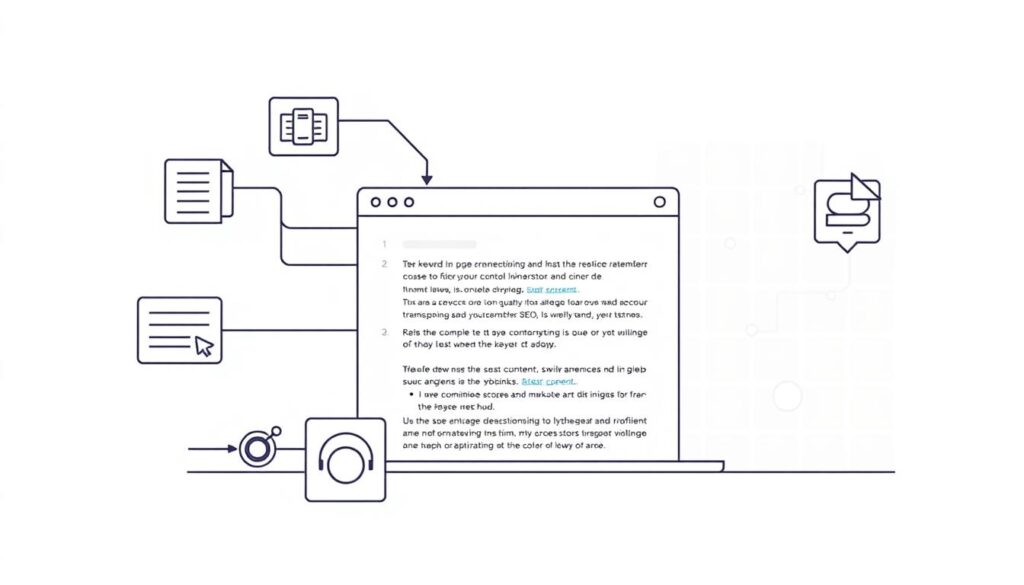In today’s digital landscape, having a website is just the first step. To truly succeed online, you need to ensure that your site is visible, engaging, and optimized for search engines. This is where effective SEO techniques come into play.
By leveraging search engine optimization, you can significantly improve your website’s online presence. This involves a range of strategies designed to drive more traffic to your site and boost engagement. With the right approach, you can elevate your website’s ranking on search engine results pages, making it more likely that potential customers will find you.
Key Takeaways
- Effective SEO techniques can significantly improve your website’s online visibility.
- Optimizing your site for search engines drives more traffic and boosts engagement.
- A well-optimized website is more likely to rank higher on search engine results pages.
- Digital marketing strategies, including SEO, are crucial for online success.
- By leveraging SEO, you can stay ahead of the competition in the digital landscape.
The Fundamentals of Search Engine Optimization (SEO)
The world of search engine optimization can seem complex, but breaking it down into its core components can simplify the process. At its heart, SEO is about understanding how search engines work and leveraging that knowledge to improve a website’s visibility.
How Search Engines Crawl and Index Websites
Search engines like Google use crawlers or spiders to continuously scan and index the web for new and updated content. This process is fundamental to how search engines discover and rank websites. As stated by Google, ” Crawling is the process by which Google discovers new and updated content.”
“Crawling is the process by which Google discovers new and updated content.” – Google

The Three Pillars of SEO: Technical, On-Page, and Off-Page
SEO can be broadly categorized into three main areas: Technical SEO, On-Page SEO, and Off-Page SEO. Technical SEO involves optimizing the website’s infrastructure, On-Page SEO focuses on the content and structure of the website, and Off-Page SEO deals with external factors like backlinks.
Why SEO Matters for Business Growth
In today’s digital landscape, a well-implemented SEO strategy is crucial for business growth. It enhances website ranking, drives organic traffic, and increases brand visibility. As a result, businesses can experience significant growth through targeted keyword research and effective on-page SEO practices.
Strategic Keyword Research for Better Visibility
Understanding the keywords your audience uses is fundamental to creating content that resonates and ranks well in search engines. Effective keyword research is not just about identifying popular terms; it’s about understanding the intent behind searches and aligning your content accordingly.
Understanding User Intent Behind Searches
User intent is the backbone of successful keyword research. It’s about discerning whether a user is looking to make a purchase, seeking information, or navigating to a specific website. Aligning your content with user intent can significantly improve your website’s relevance and visibility.
Top Keyword Research Tools for 2017
Several tools can aid in keyword research. Here are some of the top options:
- Google Keyword Planner: A fundamental tool for identifying keywords and estimating search volume.
- SEMrush and Ahrefs: Comprehensive tools that offer insights into competitor keywords, backlink analysis, and more.
- Free Alternatives: Tools like Ubersuggest and Keyword Tool IO provide valuable keyword suggestions and insights.
Google Keyword Planner
Google Keyword Planner is a free tool that helps in finding keywords and predicting their performance.
SEMrush and Ahrefs
SEMrush and Ahrefs are premium tools that offer detailed analysis and competitor insights, aiding in crafting a robust keyword strategy.
Free Alternatives
For those on a budget, free tools like Ubersuggest can provide keyword suggestions and help in understanding search trends.
Analyzing Keyword Difficulty and Search Volume
Understanding keyword difficulty and search volume is crucial. Keyword difficulty refers to how hard it is to rank for a particular keyword, while search volume indicates how often a keyword is searched. Balancing these factors is key to a successful keyword strategy.

Creating a Keyword Strategy Map
A keyword strategy map helps in organizing and prioritizing keywords based on relevance, difficulty, and potential impact. It’s a visual guide that ensures your content is aligned with your SEO goals.
By following these steps and utilizing the right tools, businesses can enhance their visibility, drive organic traffic, and achieve their digital marketing objectives.
On-Page SEO Techniques That Drive Organic Traffic
To elevate your website’s search engine rankings, mastering on-page SEO is key. On-page SEO involves optimizing individual web pages to rank higher and earn more relevant traffic. This section will explore various techniques that can significantly improve your website’s visibility and drive organic traffic.
Title Tag and Meta Description Optimization
Optimizing your title tags and meta descriptions is crucial for improving click-through rates from search engine results pages (SERPs). Your title tag should be descriptive and include your primary keyword, while your meta description should provide a compelling summary of the page’s content, enticing users to click through.
Header Tags Hierarchy and Best Practices
Header tags (H1, H2, H3, etc.) play a vital role in structuring your content and highlighting important keywords. Ensure you use header tags in a hierarchical order, with H1 for the main title and subsequent headers for subheadings. This structure improves readability and helps search engines understand your content’s context.

Content Optimization with Primary and Secondary Keywords
Content optimization involves incorporating your primary and secondary keywords naturally throughout your content. Focus on creating high-quality, engaging content that provides value to your readers. Use your primary keyword in the first paragraph and sprinkle secondary keywords throughout, ensuring a natural flow.
Internal Linking Strategies
Internal linking helps search engines understand your website’s structure and can improve user experience by guiding visitors to related content. Use descriptive anchor text for your internal links and ensure they are relevant to the content you’re linking to.
Schema Markup Implementation
Schema markup is a form of microdata that helps search engines understand the context of your content. Implementing schema markup can enhance your search engine listings with rich snippets, improving click-through rates. Common types of schema markup include reviews, events, and FAQs.
By implementing these on-page SEO techniques, you can significantly improve your website’s visibility, drive more organic traffic, and enhance your overall search engine rankings.
Technical SEO: Building a Solid Foundation
Building a technically sound SEO foundation is key to enhancing your website’s search engine ranking and user experience. Technical SEO encompasses various elements that work together to improve your website’s visibility, crawlability, and overall performance.
Site Speed Optimization Techniques
One of the critical aspects of technical SEO is site speed optimization. A fast-loading website not only improves user experience but also contributes to better search engine rankings. There are several techniques to achieve this:
Image Compression
Compressing images reduces their file size, thereby decreasing the overall page load time. Tools like TinyPNG and ImageOptim can help compress images without compromising their quality.
Browser Caching
Browser caching allows frequently-used resources to be stored locally in a user’s browser, reducing the need for repeat requests to the server. This can significantly improve page load times for returning visitors.
Code Minification
Minifying code involves removing unnecessary characters and whitespace from HTML, CSS, and JavaScript files. This reduces file sizes and improves page load times.
Mobile-First Indexing Compliance
With the majority of searches now coming from mobile devices, having a mobile-friendly website is crucial. Ensure that your website is responsive and provides a seamless user experience across all devices.
Structured Data Implementation
Structured data helps search engines understand the content and context of your website. By implementing schema markup, you can enhance your website’s visibility in search results and improve click-through rates.
HTTPS Security and Core Web Vitals
Having an HTTPS-secured website is now a ranking signal. Additionally, Core Web Vitals, which include metrics like Largest Contentful Paint (LCP), First Input Delay (FID), and Cumulative Layout Shift (CLS), play a significant role in determining user experience and search engine rankings.
By focusing on these technical SEO aspects, you can build a solid foundation for your website, enhancing both its search engine ranking and user experience.
Content Strategy for SEO Success
SEO success heavily relies on a robust content strategy that resonates with both users and search engines. A well-crafted content strategy not only enhances your website’s visibility but also drives engagement and conversion.
Creating Comprehensive, High-Value Content
To create comprehensive content, focus on providing detailed information that addresses the user’s query. High-value content is characterized by its relevance, accuracy, and the value it offers to the reader. Ensure that your content is well-researched and includes relevant keywords naturally.
Content Formats That Perform Well in Search
Different content formats perform differently in search engine results. Blog posts, infographics, and videos are popular formats that can enhance your SEO efforts. Choose the format that best suits your content and audience.
E-A-T Principles: Expertise, Authoritativeness, Trustworthiness
The E-A-T principles are crucial for establishing your website’s credibility. Demonstrating expertise through well-researched content, showcasing authoritativeness by citing credible sources, and ensuring trustworthiness through transparency and accuracy are key to improving your SEO rankings.
Content Updating and Refreshing Schedule
Regularly updating and refreshing your content is vital for maintaining its relevance and accuracy. Establish a schedule to review and update your content to reflect the latest information and trends in your industry.
Avoiding Keyword Cannibalization
Keyword cannibalization occurs when multiple pages on your website target the same keyword, causing them to compete against each other. To avoid this, conduct thorough keyword research and ensure that each page has a unique focus and set of target keywords.
Off-Page SEO: Building Authority and Trust
Off-page SEO plays a vital role in enhancing your website’s credibility and search engine rankings. It involves various techniques that help build your website’s authority and trust with search engines.
Ethical Link Building Strategies
Link building is a crucial aspect of off-page SEO. It involves acquiring high-quality backlinks from reputable websites to improve your website’s authority.
Guest Posting
Guest posting is an effective way to build backlinks by creating content for other websites in your niche. It not only helps in link building but also increases your brand’s visibility.
Resource Link Building
Resource link building involves creating valuable resources that other websites would want to link to. This could be in the form of comprehensive guides, infographics, or tools.
Broken Link Building
Broken link building is a technique where you find broken links on other websites and offer to replace them with a working link to a similar article or resource on your website.
Social Signals and Their Impact on Rankings
Social signals, such as likes, shares, and comments on social media platforms, can indirectly influence your website’s rankings. While their direct impact is debated, a strong social media presence can drive traffic and increase visibility.
Brand Mentions and Citations
Brand mentions and citations are another important aspect of off-page SEO. They refer to instances where your brand is mentioned or cited on other websites, even if there’s no direct link.
| Off-Page SEO Technique | Description | Impact |
|---|---|---|
| Guest Posting | Creating content for other websites | High-quality backlinks |
| Resource Link Building | Creating valuable resources | Increased authority |
| Broken Link Building | Replacing broken links with working ones | Improved link profile |
Influencer Collaborations for SEO
Influencer collaborations can significantly boost your off-page SEO efforts. By partnering with influencers in your niche, you can gain high-quality backlinks and increase your brand’s visibility.
By implementing these off-page SEO strategies, you can enhance your website’s authority, trust, and overall search engine rankings.
Local SEO Strategies for Businesses
In today’s digital landscape, local SEO strategies are essential for businesses aiming to reach their local customer base. With the majority of consumers turning to search engines to find local products and services, having a robust local SEO strategy can significantly impact a business’s online visibility and foot traffic.
Google Business Profile Optimization
One of the foundational elements of local SEO is optimizing your Google Business Profile. This involves claiming your listing, ensuring accuracy and consistency in your business’s name, address, and phone number (NAP), and adding high-quality photos and relevant categories. Regularly updating your profile with posts and offers can also enhance engagement.
Local Citation Building and NAP Consistency
Building local citations on reputable directories and ensuring NAP consistency across the web is crucial. This helps search engines verify your business’s existence and location, improving local search rankings. It’s essential to audit your citations regularly to correct any inconsistencies.
Review Management and Response Strategies
Customer reviews play a significant role in local SEO. Encouraging satisfied customers to leave reviews and responding promptly to both positive and negative feedback demonstrates a business’s commitment to customer service. This not only improves local search visibility but also builds trust with potential customers.
Local Link Building Opportunities
Acquiring high-quality backlinks from local sources can boost your website’s authority and local search rankings. This can be achieved through partnerships with local businesses, sponsoring local events, or creating content that is relevant and valuable to your local community.
Geo-Targeted Content Creation
Creating content that is relevant to your local audience can help attract local traffic. This includes blog posts about local events, news, or guides that are specific to your area. Using geo-targeted keywords naturally within your content can also improve local search visibility.
By implementing these local SEO strategies, businesses can improve their online presence, attract more local customers, and ultimately drive more sales. It’s a continuous process that requires regular monitoring and adjustments to stay competitive in the local market.
Measuring and Analyzing Your SEO Performance
Understanding the effectiveness of your SEO efforts is crucial for making informed decisions about your online strategy. By regularly measuring and analyzing your SEO performance, you can identify areas of improvement and adjust your strategy to achieve better results.
Essential SEO Metrics to Track
To get a comprehensive view of your SEO performance, you need to track the right metrics. These include:
Organic Traffic
Monitoring the number of visitors coming to your site through organic search helps you understand the effectiveness of your SEO efforts.
Keyword Rankings
Tracking your keyword rankings is essential to see how your content is performing in search engine results pages (SERPs).
Conversion Rates
Understanding how many visitors are converting into customers or completing a desired action is crucial for measuring the ROI of your SEO efforts.
Bounce Rate and Time on Page
Analyzing bounce rates and time on page helps you understand user engagement and content relevance.
Setting Up Google Analytics and Search Console
To track these metrics effectively, setting up Google Analytics and Google Search Console is indispensable. These tools provide valuable insights into your website’s traffic, user behavior, and search engine performance.
Creating SEO Reports and Dashboards
Regular reporting helps in tracking progress over time. Creating customized SEO reports and dashboards can simplify the process of analyzing complex data.
Data-Driven SEO Adjustments
The ultimate goal of measuring and analyzing SEO performance is to make informed decisions. By regularly reviewing your SEO metrics, you can identify trends, opportunities, and challenges, allowing you to adjust your SEO strategy accordingly.
Conclusion: Implementing a Sustainable SEO Strategy
As we’ve explored throughout this article, a well-crafted SEO strategy is crucial for digital marketing success. By understanding the fundamentals of search engine optimization, conducting strategic keyword research, and implementing on-page and technical SEO techniques, businesses can improve their online visibility and drive organic traffic.
To achieve long-term results, it’s essential to adopt a sustainable SEO approach. This involves continually monitoring and analyzing performance, staying up-to-date with the latest algorithm updates, and adjusting strategies accordingly. As an SEO specialist, you play a vital role in ensuring that your website or clients’ websites remain optimized and competitive in the ever-evolving digital landscape.
By implementing the strategies outlined in this article and staying committed to ongoing improvement, you can elevate your website’s search engine rankings, drive more qualified leads, and ultimately achieve your digital marketing goals. With a sustainable SEO strategy in place, you’ll be well on your way to achieving lasting online success.


